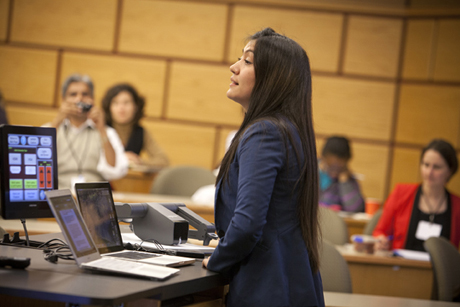Social entrepreneurs share ideas at conference
By Kathy Hovis

Entrepreneurs whose businesses have a social justice focus gathered at Cornell Nov. 15-17 to network and learn how to move their ideas forward.
The Second Finger Lakes Social Entrepreneurship Institute, sponsored by Cornell’s Center for Transformative Action, drew 100 entrepreneurs from across the state and included speakers, networking events and workshops.
Two highlights of the event were pitch presentations by 16 participants and a TEDx event featuring messages from alumni social entrepreneurs.
“Last year had such an impact in helping me connect with others working in the social space,” said Scott Morris of Ithaca, whose company AmeriQoin offers local currency systems for communities. “I wanted to bring the latest iteration of my vision to the community in an effort to continue building my local resource base.”
Participants chose workshops that helped with business model development, focused on making a social business financially sustainable or talked about creating community infrastructure to support social entrepreneurs.
“The highlight of the event is seeing people engage with each other, sharing their own stories and being inspired by those of others,” said Anke Wessels, director of the Center for Transformative Action, “then digging into challenging material to further their ideas and their dreams.”
Anshu Gaur ’17 took part in the conference to develop her idea for a gym dedicated to people with diabetes. “This gym would integrate all the modes of recovery: nutrition, exercise, education, all in one facility and create a sense of community,” she said.
Rosanne Placencia came to the conference to work on her dream: a café offering healthy food choices for her South Bronx neighborhood. Her restaurant would not only offer fresh local fare, but also feature classes on healthy cooking, host community events and give jobs to neighborhood residents.
“This has been in my heart and my spirit for a long time, but now I’m finally putting it on paper,” she said. “My biggest take-away is the realization that I need to identify a team of people that will work with me. It is a huge project, and I need a lot of help.”
After each five-minute presentation, a panel of local judges offered tips to presenters.
Sunday afternoon’s TEDx presentations featured six alumni and a doctoral candidate, who shared stories of lessons they’ve learned.
Bill Myers ’73 said that his motivation in becoming a banker came from his mother, who told him to eat his vegetables “because there are people starving in other parts of the world.”
He took that message to heart and figured out he could have the most impact by getting into banking and changing how the economy works. In 1979 Myers founded Ithaca’s Alternatives Federal Credit Union, which offers loans for solar power projects; car loans for “unbanked” people; financial counseling; student credit unions; and other services.
Now Myers works in the Office of Small Credit Union Initiatives, part of the National Credit Union Administration. “There’s room for social entrepreneurship in any field you choose,” he said. “What’s important is to hear your own voice, imagine a world that you want to live in and then create it.”
The Institute was sponsored by Entrepreneurship@Cornell; Engaged Learning + Research; the Iscol Family Program for Leadership Development in Public Service; Local First Ithaca; the Samuel Curtis Johnson Graduate School of Management’s Entrepreneurship and Innovation Institute; and the Park Foundation.
Kathy Hovis is a writer for Entrepreneurship@Cornell.
Media Contact
Get Cornell news delivered right to your inbox.
Subscribe